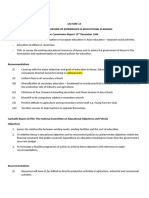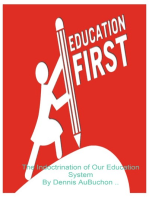Assignment
Uploaded by
kibunjaj92Assignment
Uploaded by
kibunjaj92NAME;SAMORINE TEMKO MBISHEI
REG;EDA/486/24
COURSE CODE;EDUF 111
LECTURER;WANJALA JUSTUS
1. Discuss David koech commission report of 1999
The David Koech commission report played a significant role in the reviewing of the
8-4-4 system.The report was authored as a result of extensive consultations and
research aimed at reforming Kenya’s education system to align it with the country’s
socio-economic needs and the vision 2030 goals.The report had several objectives
including:
Evaluating the 8-4-4 system of education:The report was supposed to assess the
relevance of the 8-4-4 system.it was also to point its strength and weaknesses since
the time of its implementation in 1985.after this it was to give some
recommendations to curb the weaknesses of the education system.
Inclusivity and accessibility:The report had a task of addressing disparities in the
assess of educational facilities.This meant that people from diverse groups of the
country were supposed to get easy access to educational facilities.It was also to
focus on education quality across all regions and socio-economic groups.
Propose reforms:After researching thoroughly on the education system,the report
was to recommend some changes to ,make the education system more effective and
ensure it was in a position to meet the national developmental needs in
general.Some of these recommendations are:
Curriculum reform:The report suggested reducing the academic load in the 8-4-4
system by integrating more vocational and technical training.To also emphasize on
co-curricular activities and moral education to nuture students talents.
Restructuring of the education system:It proposed replacement of 8-4-4 with CBC
which aimed at providing learners with more flexibility in different grounds and
personal specialization opportunities.
Teacher training and development:It recommended continuous professional
development for the teachers .It also advocated for better teacher pay and better
working conditions.
Technology integration:The report urged the use of information and communication
technology(ICT) in schools to prepare students for the rapidly changing world.
Inclusive education:The report called for equitable access to education,particularly
for marginalized groups,children with disabilities and those in rural areas.It also
recommended for the integration of special needs education into mainstream
schools.
2. Discuss the major contributions of Jean Jacques Rousseau to modern education.
Jean Jacques a renowed philosopher made great impacts in the field of education.
He challenged the traditional approach to teaching and learning. His most notable
contributions are in his seminal works ‘‘emile or on education’’.His major
contributions to modern education are:
Developmental stages: He proposed that education should align with the natural
stages of child growth.At infancy the focus should be on physical development of the
child.At childhood ,experimental learning to allow to allow children interact with the
environment is given.Intellectual development was to be done at adolescence and at
the youth level the students were to be prepared for personal responsibilities.
Child-centred education: He emphasized on the importance of understanding the
nature and needs of children .He argued that children should be left to grow
naturally without any interferences from adults and societal expectations.
Experimental learning:He rejected memorization and advocated experimental
learning where children learn through direct interaction with their environment.This
underpins project based learning today.
Freedom and natural learning:He proposed that children should be given the
freedom to explore their talents as forced learning kills curiosity and creativity .This
influenced modern practices of providing learners with autonomy in their education.
Personalized learning:He believed education should be tailored at each child’s
ability ,interest and peace of learning.This concept underlies the modern approaches
like the differentiated instructions.
Critique of formal education :He criticized the formal education system for their rigid
structure and focus on conformity which suppressed creativity and individuality.This
encouraged the ongoing efforts to reform the traditional schooling system.
3. What problems did Kenya have that led to the introduction of CBC.
The introduction of CBC was driven by the need to address the limitations in the 8-4-
4 system of education.This was in alignment with the national development needs in
general.Some of these problems include:
Need for skills development:The labour market increasingly required
technical,vocational and soft skills such as critical thinking,creativity and team
work.CBC was introduced to equip learners with the 21st century skills to improve
employability and adaptability of the changing world.
Limitations of the 8-4-4 system:The 8-4-4 system was criticized for only focusing on
academic performance and memorization rather than the practical skills.The system
also failed nuture students talents and equip them with relevant skills employability
leaving them jobless.
Recommendations from educational reviews:Several commissions highlighted the
need for reforms in Kenya’s education system.These are:The Koech’s commission
report which recommended a holistic and skill based education system which heavily
influenced the CBC’s structure.The vision 2030 Kenya’s long-term development
blueprint which emphasized education as a tool for creating a globally competitive
and adaptive workforce.
Promoting holistic development:CBC aimed at providing learner-centered education
that fosters intellectual,emotional,physical and social development.It focuses on
providing well-round individuals who are self-reliant and ethically grounded.
Inadequate infrastructure:8-4-4 system lacked essential facilities for educational
purpose such as classroom,laboratories and workshops.CBC was introduced to curb
this.However,this hasn’t been efficient since CBC requires specialized facilities such
as art spaces which most schools lacks.
Teacher preparedness:8-4-4 teachers were not adequately prepared to effectively
implement the curriculum resulting in focus to exams preparation leading to
introduction of CBC.However,CBC in turn required a higher level of teacher training
to adapt the new demands.
You might also like
- EDUCATIONAL REFORMS AND NATIONAL EDUCATIONAL POLICY - NURSING EDUCATION ASSIGN. (1)No ratings yetEDUCATIONAL REFORMS AND NATIONAL EDUCATIONAL POLICY - NURSING EDUCATION ASSIGN. (1)14 pages
- A Semi Detailed Lesson Plan in Bsed Soc Sci 19100% (6)A Semi Detailed Lesson Plan in Bsed Soc Sci 193 pages
- 1 A Brief On Education Sysetm in Kenya Since IndependenceNo ratings yet1 A Brief On Education Sysetm in Kenya Since Independence14 pages
- All Together Now: Volume 1: Professional Learning Communities and Leadership PreparationFrom EverandAll Together Now: Volume 1: Professional Learning Communities and Leadership PreparationNo ratings yet
- Transformational Teaching: The Key <Br>To Authentic <Br>School ImprovementFrom EverandTransformational Teaching: The Key <Br>To Authentic <Br>School ImprovementNo ratings yet
- Developing Resilient Youth: Classroom Activities for Social-Emotional CompetenceFrom EverandDeveloping Resilient Youth: Classroom Activities for Social-Emotional CompetenceNo ratings yet
- Competence-Based Curriculum (CBC) in Kenya and The Challenge of Vision 2030No ratings yetCompetence-Based Curriculum (CBC) in Kenya and The Challenge of Vision 203015 pages
- EQUITY IN EDUCATION: A Comprehensive Guide to Creating Inclusive Learning EnvironmentsFrom EverandEQUITY IN EDUCATION: A Comprehensive Guide to Creating Inclusive Learning EnvironmentsNo ratings yet
- CBC As Example of Carriculum Change in KenyaNo ratings yetCBC As Example of Carriculum Change in Kenya23 pages
- Reimagining Schools and School Systems: Success for All Students in All SettingsFrom EverandReimagining Schools and School Systems: Success for All Students in All SettingsNo ratings yet
- Paper 102 Unit 3 (The Kothari Education Commission)No ratings yetPaper 102 Unit 3 (The Kothari Education Commission)14 pages
- The Audacity to Teach!: The Impact of Leadership, School Reform, and the Urban Context on Educational InnovationsFrom EverandThe Audacity to Teach!: The Impact of Leadership, School Reform, and the Urban Context on Educational InnovationsNo ratings yet
- Curriculum Reforms in Kenya Since IndependenceNo ratings yetCurriculum Reforms in Kenya Since Independence47 pages
- 3.3 Education in Conteporary in India: Post Independence Education PeriodNo ratings yet3.3 Education in Conteporary in India: Post Independence Education Period23 pages
- Watching Students Glo: General Learner Outcomes Build CharacterFrom EverandWatching Students Glo: General Learner Outcomes Build CharacterNo ratings yet
- Changes in the Higher Education Sector: Contemporary Drivers and the Pursuit of ExcellenceFrom EverandChanges in the Higher Education Sector: Contemporary Drivers and the Pursuit of ExcellenceNo ratings yet
- Essentials of Foundations of Education: Introducing New Useful Modern Concepts of Education to Student–Teachers Under B.Ed. TrainingFrom EverandEssentials of Foundations of Education: Introducing New Useful Modern Concepts of Education to Student–Teachers Under B.Ed. TrainingNo ratings yet
- Competence Based Curriculum ImplementatiNo ratings yetCompetence Based Curriculum Implementati28 pages
- Seminar Note On Indias - National - Curriculum - Framework - A - CNo ratings yetSeminar Note On Indias - National - Curriculum - Framework - A - C6 pages
- EDUCATIONAL REFORMS AND NATIONAL EDUCATIONAL POLICY - NURSING EDUCATION ASSIGN.No ratings yetEDUCATIONAL REFORMS AND NATIONAL EDUCATIONAL POLICY - NURSING EDUCATION ASSIGN.13 pages
- SSCI TT 2024-2025 SEM1 FINAL DRAFT Teaching TT EDITED SEPT 13THNo ratings yetSSCI TT 2024-2025 SEM1 FINAL DRAFT Teaching TT EDITED SEPT 13TH34 pages
- Principles Underlying Teaching: Presented To: Education 14 Class100% (2)Principles Underlying Teaching: Presented To: Education 14 Class33 pages
- Natalie Perry: Don D. Shute School, East Peoria, ILNo ratings yetNatalie Perry: Don D. Shute School, East Peoria, IL3 pages
- What Is Understanding by Design (Ubd) ?: Tyler L. D'Angelo, Andrew C. Thoron, and J. C. BunchNo ratings yetWhat Is Understanding by Design (Ubd) ?: Tyler L. D'Angelo, Andrew C. Thoron, and J. C. Bunch5 pages
- Temple-Roberts Rachel Informationliteracyplan Frit7136No ratings yetTemple-Roberts Rachel Informationliteracyplan Frit71369 pages
- Handling Students Behavior: Reporters: Stephen Cambas BSED-Math IV Olda Rica Pia BSED-Filipino IINo ratings yetHandling Students Behavior: Reporters: Stephen Cambas BSED-Math IV Olda Rica Pia BSED-Filipino II28 pages
- Daily Lesson Plan: TOPIC UNIT 8 - How The Tiger Got Its StripesNo ratings yetDaily Lesson Plan: TOPIC UNIT 8 - How The Tiger Got Its Stripes1 page
- Listening Activities in The Classroom: PURPOSE: To Create and Model Good Listening StrategiesNo ratings yetListening Activities in The Classroom: PURPOSE: To Create and Model Good Listening Strategies2 pages
- Facilitate Learning Sessions: Cblms On Trainers Methodology Level I Document No. Issued By: Planning Training SessionsNo ratings yetFacilitate Learning Sessions: Cblms On Trainers Methodology Level I Document No. Issued By: Planning Training Sessions160 pages
- Edu-480 Week 4 Communication Skills Newsletter100% (3)Edu-480 Week 4 Communication Skills Newsletter3 pages
- Kindergarten SAMPLE WEEKLY HOME LEARNING PLAN FinalNo ratings yetKindergarten SAMPLE WEEKLY HOME LEARNING PLAN Final6 pages
- Focus On The Learner: CELTA - Written Assignment 1No ratings yetFocus On The Learner: CELTA - Written Assignment 16 pages
- Our Classroom!: Miss Gismondi's 2nd / 3rd Grade Class - LiteracyNo ratings yetOur Classroom!: Miss Gismondi's 2nd / 3rd Grade Class - Literacy1 page







































































































